HARLINGEN — Across much of the country, food trucks have been dishing out their popular street-side specialties at so-called food truck parks for years.
Now, more food truck parks are popping up across the Rio Grande Valley.
Soon, Harlingen might be making way for its first food truck park as more residents crave a bigger variety of the popular down-home takes on tacos, burritos and nachos.
Last week, the city’s Planning and Zoning board approved a proposal that would regulate food truck parks in town.
“We’ve got food trucks in the city but no ordinance on food truck parks,” Tre Peacock, the Planning & Zoning board’s chairman, said Monday. “It was a big need. A lot of people would like to have a food truck park with multiple food trucks. Over the last few years, I know people have been requesting it.”
On Wednesday, city commissioners will hold a public hearing into the proposal as they mull passing an ordinance’s first reading.
“We’ve had some requests for years,” City Manager Dan Serna said. “There are food truck parks in different parts of the Valley and state. In certain areas they do well.”
Food trucks want a park
In Harlingen, Chris Valdez believes a food truck park could offer residents a fun, lively venue for spicy tantalizing grub.
“It’s a great idea,” Valdez, owner of the Kona Ice food truck, said. “The food truck market is growing. There are numerous food trucks. There are food trucks that the community doesn’t know about. We’re being left behind as big as the city is.”
During the coronavirus pandemic, food truck parks offer residents safer outdoor dining venues, Valdez said.
Now, food truck owners pay street-side landlords $30 to $50 a day to park their trucks on their sites as part of their efforts to comply with health department regulations requiring access to restrooms.
If the city opens a food truck park, Valdez is counting on officials to allow local food truck owners to park there before offering sites to out-of-town trucks.
“If they open a food truck park, I would like them to give first consideration to food trucks that reside in Harlingen,” she said. “We’re always competing with outside food trucks that do not reside in Harlingen.”
Across the country, food truck parks can mean big business, featuring concerts drawing large crowds.
South Padre Island in court
But in some cities like South Padre Island, food truck regulations have ended up in court.
Last month, Cameron County state District Judge Arturo Cisneros Nelson struck down South Padre Island’s 12-truck cap on food trucks along with a clause requiring food truck owners to get restaurants’ permission to qualify for permits.
Now, Island officials are appealing the ruling.
Harlingen’s proposed ordinance
In Harlingen, the Planning and Zoning board’s proposed ordinance describes a food truck park as a “parcel of privately owned land where two or more mobile food trailers or concession trailers congregate on a continuous regular basis selling food or beverages to the public.”
Under the proposal, the city would restrict food truck parks to general retail or industrial zoning districts.
Inside food truck parks, the proposed ordinance would require food trucks to be located at least 10 feet from each other.
The proposed ordinance would also require food trucks be equipped with approved potable water hookups, sewer facilities and grease traps.
Meanwhile, workers who handle food and beverages would be required to show valid food handler’s training certificates.
The proposed ordinance would prohibit food trucks from advertising through the use of loud speakers and amplifiers.
Now, an ordinance requires food trucks to be located at least 1,000 feet from homes and businesses such as restaurants.
Meanwhile, the ordinance requires food trucks selling alcohol to hire security guards during peak hours from 9 p.m. to 2 a.m. Thursdays to Saturdays.
Under the current ordinance, the city requires food trucks to provide video surveillance and adequate lighting along with approved waste receptacles.




